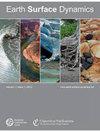Autogenic vs Subsidence Controls on Grain Size Fining through Multi-Channel Landscape Evolution Modelling
IF 2.9
2区 地球科学
Q2 GEOGRAPHY, PHYSICAL
引用次数: 0
Abstract
Abstract. Within the stratigraphic record, changes in grain size are often interpreted as a signature of external forcing events. However, it is not yet well constrained how autogenic processes (such as channel mobility) influence grain size signatures within the fluvial system. Here, we combine a landscape evolution model based on the Stream Power Law but modified for sedimentation (Yuan et al., 2019) with an extension of the self-similar grain size model Fedele and Paola (2007) to multiple dimensions (i.e., along dynamically evolving river channels) to study the relative importance of autogenic processes in con- trolling grain size fining. We first show how our new model can reproduce the results obtained by classical analytical solutions assuming that fining is controlled by subsidence only, in a single or amalgamated channel. We then show that deviations from past (subsidence and single channel only) predictions arise when varying two main parameters: first the ratio between the incoming sediment flux and integrated subsidence rate (F ), which increases with the degree of bypass of the system; and second, the ratio of the discharge leaving the mountain to the discharge generated within the subsiding basin (β), which controls the shape of the topography of the basin. We demonstrate that there exists two regimes, one corresponding to low values of F or high values of β, where the grain size fining is controlled by subsidence, and one corresponding to high F and low β values, where grain size fining is controlled by autogenic processes under steep topographic slopes that propagate sedimentary waves through the basin. Coupling the LEM to a flexural model predicts that grain size fining evolves from subsidence to autogeniccontrol in basins characterized by a progressive increase of F (under-filled to over-filled foreland), as seen in the case example of the Alberta Foreland Basin. Our results indicate that grain size fining during low filling conditions (e.g. early stage as the basin is forming) can indicate the dominantly tectonic controlled parameter of the flux relative to underlying subsidence ratio (F ); whereas, any fining under high bypass conditions (e.g. late stage once the basin is overfilled) can indicate the climate controlled upstream vs downstream ratio (β).多通道地貌演化模型对粒度细化的自生与沉降控制作用
摘要在地层记录中,粒度变化通常被解释为外部作用事件的特征。然而,目前还不能很好地解释自生过程(如河道流动性)如何影响河道系统内的粒度特征。在此,我们将基于溪流幂律但针对沉积进行了修改的景观演化模型(Yuan 等,2019 年)与 Fedele 和 Paola(2007 年)的自相似粒度模型扩展到多个维度(即沿动态演化的河道)相结合,研究自生过程在控制粒度细化中的相对重要性。我们首先展示了我们的新模型是如何在单一或混合河道中重现经典分析方法得出的结果的,即假设细化仅由沉降控制。然后,我们展示了当改变以下两个主要参数时,过去(仅由沉降和单一河道控制)的预测结果会出现偏差:首先是进入的沉积通量与综合沉降速率(F)之间的比率,该比率会随着系统旁路程度的增加而增加;其次是离开山体的排水量与沉降盆地内产生的排水量之间的比率(β),该比率控制着盆地地形的形状。我们证明存在两种情况,一种是 F 值低或 β 值高,晶粒细化受沉降控制;另一种是 F 值高、β 值低,晶粒细化受陡峭地形斜坡下的自生过程控制,沉积波在盆地中传播。将 LEM 与挠曲模型耦合可预测,在以 F 值逐渐增加(前陆充填不足到前陆充填过度)为特征的盆地中,粒度细化会从沉降演变为自生控制,这在阿尔伯塔前陆盆地的案例中可以看到。我们的研究结果表明,在低充盈条件下(如盆地形成的早期阶段)的粒度细化可以表明通量相对于基本沉降比(F)的参数主要受构造控制;而在高旁通条件下(如盆地过度充盈的晚期阶段)的任何细化可以表明受气候控制的上游与下游比(β)。
本文章由计算机程序翻译,如有差异,请以英文原文为准。
求助全文
约1分钟内获得全文
求助全文
来源期刊

Earth Surface Dynamics
GEOGRAPHY, PHYSICALGEOSCIENCES, MULTIDISCI-GEOSCIENCES, MULTIDISCIPLINARY
CiteScore
5.40
自引率
5.90%
发文量
56
审稿时长
20 weeks
期刊介绍:
Earth Surface Dynamics (ESurf) is an international scientific journal dedicated to the publication and discussion of high-quality research on the physical, chemical, and biological processes shaping Earth''s surface and their interactions on all scales.
 求助内容:
求助内容: 应助结果提醒方式:
应助结果提醒方式:


